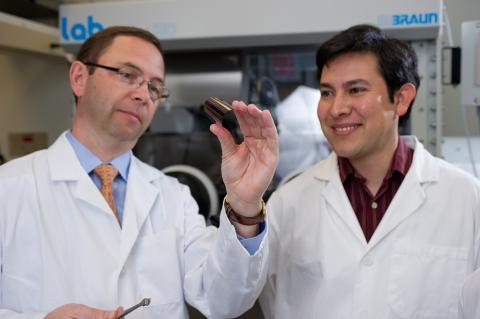Researchers at the Georgia Tech Center for Organic Photonics and Electronics (COPE) were presented the Academic R&D Award at IDTechEx Printed Electronics USA, an industry event held in Santa Clara, Calif. on December 10.
Researchers at the Georgia Tech Center for Organic Photonics and Electronics (COPE) were presented the Academic R&D Award at IDTechEx Printed Electronics USA, an industry event held in Santa Clara, Calif. on December 10.
COPE won this award after having discovered a universal technique to reduce the work function of a conductor for organic electronics. Using a polymer modifier containing simple aliphatic amine function groups to reduce the work function in a wide range of conductors, including noble metals such as gold (Au) and silver (Ag), conducting polymers, metal oxides, or graphene, air-stable low-work function electrodes were created. These polymers are inexpensive, environmentally friendly, and compatible with existing roll-to-roll mass production techniques. The method is applicable to organic electronic devices including organic solar cells, organic thin-film transistors, and organic light-emitting diodes.
Established in 2003, COPE is a premier national research and educational resource center that creates flexible organic photonic and electronic materials and devices that serve the information technology, telecommunications, energy, and defense sectors. The Center is currently led by Bernard Kippelen, a professor in the School of Electrical and Computer Engineering at Georgia Tech.
Additional Images


